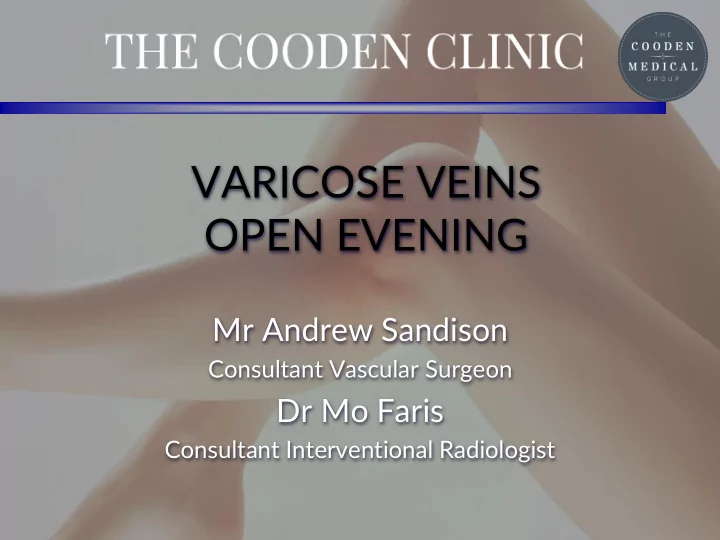

VARICOSE VEINS OPEN EVENING Mr Andrew Sandison Consultant Vascular Surgeon Dr Mo Faris Consultant Interventional Radiologist
Aims for the evening • What are varicose veins? • Treatment Options and the evidence behind them • NICE guidelines • Commonly asked questions answered • Meet the Team
What are Varicose What are Varicose Veins? Veins?
• Estimated that approximately 1/3 population have visible varicose veins • Women: Men ratio of 2.5:1 • 3-6% of people with VV will progress to venous ulcers
Causes of Varicose Veins • Genetics - 70% of patients with varicose veins have parents with varicose veins • Pregnancy - 80% of women develop varicose veins in the first trimester of pregnancy (progesterone related) • Obesity - strains vein valves • Ambulatory occupations (standing or chair sitting)
• Twisted & swollen veins • Swelling, throbbing, or cramping at night (ACHING) • Difficulty walking • Itching & burning • Restless leg
Modified CEAP CLASSIFICATION • Rated on a 0 – 6 scale – C0 = no visible venous disease – C1 = telangiectatic or reticular veins(Spider/Thread Veins) – C2 = varicose veins +/- aching, throbbing, pain – C3 = oedema / phlebitis / bleeding – C4 = skin changes without ulceration – C5 = skin changes with healed ulceration – C6 = skin changes with active ulceration
Reticular veins
C3 Oedema
C5: Healed Ulcers
C6: Active Ulcer
• Compression stockings – relief of symptoms • Surgical vein stripping • Ultrasound Guided Foam Sclerotherapy • Avulsions / Phlebectomies • Endovenous Laser Ablation
For people with confirmed varicose veins and truncal reflux: Offer Endovenous thermal treatment of the saphenous vein [NICE interventional procedure guidance 52]). If endothermal ablation is unsuitable, offer ultrasound-guided foam sclerotherapy (see Ultrasound- guided foam sclerotherapy for varicose veins [NICE interventional procedure guidance 440]). If ultrasound-guided foam sclerotherapy is unsuitable, offer surgery.
Surgical Vein Stripping • Surgical procedure under general anesthesia • Painful recovery process • Complications = infection, nerve damage, bleeding
1% serious complications DVT, neurovascular damage 15% minor complications infection, seroma, nerve damage, haematoma General anaesthetic Fit to drive 7-14 days, work 14-21 days Recurrence
Sclerosing agent is injected into incompetent segment of vein
Complications: Foam Sclerotherapy Pigmentation Skin Skin ulceration Deep vein thrombosis Chest pain Visual disturbance / Stroke
• Several small incisions • Removal of portions of vein with each incision
• Laser fibre is inserted into vein • Laser is activated and pulled back • Blood boils and the vein closes • Laser terminology: – Solid state diode laser console – Power = 10 – 30 Watts – Wavelength = 1470 nanometers
Varicose vein symptoms Endovenous laser therapy
Ultrasound Ultrasound Exam Exam and Leg and Leg Marking Marking
Saphenofemoral Tip of Bright Tip Tip of Sheath Junction Fiber
The anaesthetic acts as insulation and to provide pain management during the procedure.
Laser energy is delivered into blood, not the vessel wall
Recommend the use of over the counter analgesics to manage minor post procedure pain.
Walk Walk Out Out of the of the Clinic Clinic
• Improvements over vein stripping – 45 minute treatment time – Immediate walking – Performed in clinic environment – No general anaesthetic • Clinical results are established – Two, three, and five year follow up success rates at 95% - 98%* – Complications are mild and infrequent
5 Year Follow Up: Modality Success Rate Surgical Stripping 75.7%- 95% Sclerotherapy 73.5% Radiofrequency 79.9% Endovenous laser ablation 95.4%
Before After
Before After
Before Endovenous 5 weeks after laser therapy Endovenous laser therapy
Before After
Recommend
More recommend